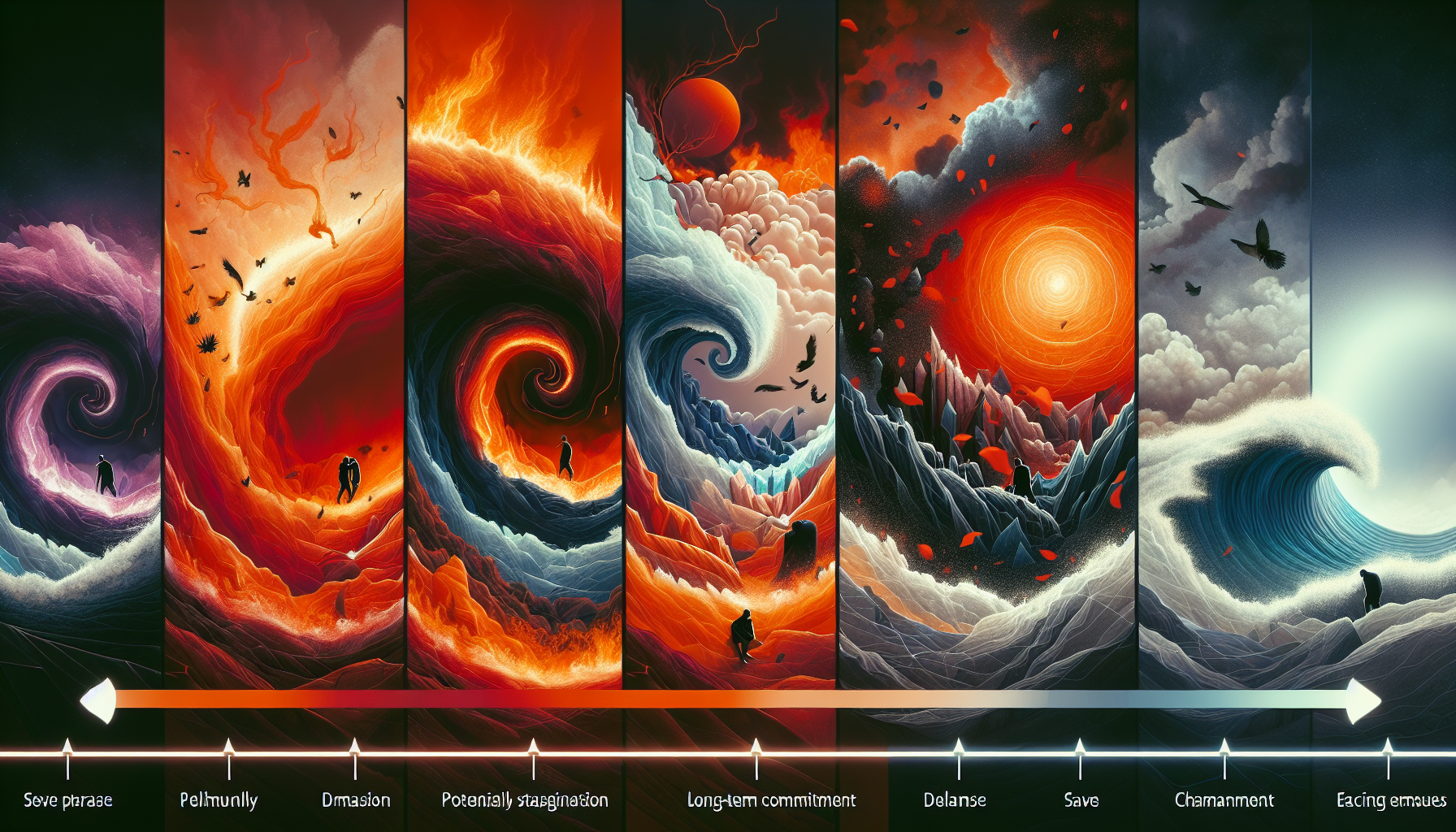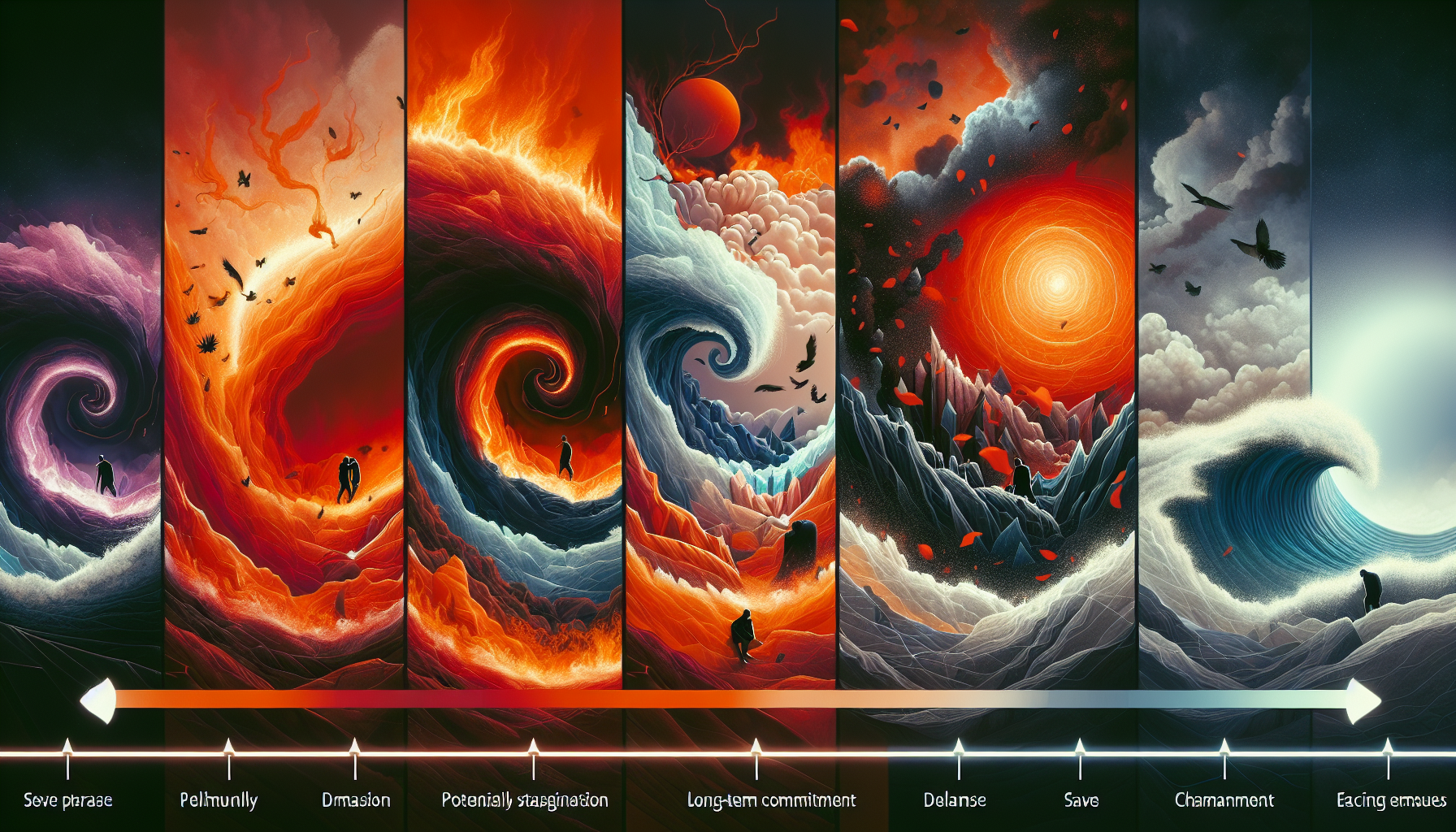
So you’re in a relationship, huh? Congratulations on finding someone special! Relationships can be an incredible journey filled with love, happiness, and personal growth. But let’s be real for a moment. As much as we’d like to believe that love conquers all, there are certain periods within a relationship that can test even the strongest bonds. From the exciting honeymoon phase to the inevitable challenges that arise, let’s explore together which time of a relationship can be considered the most challenging. Buckle up, because we’re about to navigate the highs and lows of love!
The Early Stage
Adjusting to Each Other’s Habits
In the early stage of a relationship, you and your partner are still getting to know each other on a deeper level. This is a time of excitement and discovery, as you learn about each other’s interests, quirks, and habits. It’s important to approach this stage with an open mind and a willingness to accept and adapt to each other’s habits. You may discover that your partner has certain behaviors or routines that are different from your own. It’s essential to have patience and understanding as you navigate these differences and find a way to adjust to each other’s habits harmoniously.
Establishing Boundaries
As you enter into a committed relationship, it becomes increasingly important to establish clear boundaries. Boundaries are guidelines that define what is acceptable and respectful behavior within the relationship. Each person may have different needs and expectations when it comes to personal space, alone time, and privacy. It’s crucial to communicate openly and honestly with your partner about your boundaries and to respect their boundaries as well. Establishing clear boundaries can help foster a sense of trust, comfort, and mutual respect within the relationship.
Navigating the Honeymoon Phase
Ah, the honeymoon phase – that blissful period at the beginning of a relationship when everything feels magical and perfect. During this stage, you and your partner are infatuated with each other, and it’s easy to overlook any potential challenges or conflict. However, it’s important to remember that the honeymoon phase is just that – a phase. As time goes on, the initial excitement may fade, and you may start to encounter more realistic aspects of each other’s personalities. It’s crucial to approach this stage with a balanced perspective and to keep the lines of communication open. Navigating the transition from the honeymoon phase to a deeper, more mature stage of the relationship requires understanding, patience, and a willingness to grow together.
The Long-Term Commitment
Facing Challenges as a Unit
As your relationship progresses into a long-term commitment, you and your partner will undoubtedly face challenges together. These challenges may come from external sources such as work or family issues, or they may arise from within the relationship itself. It’s important to remember that you are a team, and tackling these challenges as a unit will strengthen your bond. By facing challenges together, you can learn to communicate effectively, problem-solve, and rely on each other for support. Remember, it’s not about avoiding challenges but about how you navigate through them as a couple.
Dealing with Routine and Boredom
In any long-term relationship, routine and boredom can become stumbling blocks if not addressed. As the initial excitement of the relationship settles into a more predictable rhythm, it’s common to experience moments of monotony and boredom. However, it’s essential to remember that routine does not have to equate to boredom. It’s about finding ways to keep the relationship fresh and exciting. This could involve trying new activities together, planning surprises, or simply dedicating time for shared interests. By actively engaging in the relationship and seeking out new experiences, you can combat routine and inject new energy into your connection.
Maintaining Intimacy and Connection
As the years go by, maintaining intimacy and connection can become more challenging. Busy schedules, career demands, and the everyday stresses of life can take a toll on a relationship. It’s important to prioritize intimacy and connection by making time for each other and engaging in activities that foster emotional and physical intimacy. This could include date nights, weekend getaways, or simply setting aside time each day to check in and connect on a deeper level. By actively nurturing your bond and making it a priority, you can ensure that intimacy and connection remain strong throughout the course of your relationship.

The Midlife Crisis
Reassessing Goals and Priorities
The midlife crisis is a period of self-reflection and reassessment that often occurs in the middle years of a relationship. During this time, you may find yourself questioning your goals, aspirations, and priorities. It’s important to recognize that these feelings are normal and to approach them with openness and understanding. Use this time to have honest and open conversations with your partner about your individual goals and how they align with the future of your relationship. By supporting each other’s personal growth and revisiting shared goals, you can navigate this phase together and emerge stronger as a couple.
Dealing with Empty Nest Syndrome
One common challenge that arises in the midlife stage of a relationship is empty nest syndrome. As children grow up and leave home, couples may find themselves feeling lost, lonely, or unsure of how to redefine their relationship. It’s important to acknowledge and validate these feelings while also exploring new opportunities for growth and connection. This could involve pursuing individual interests, rediscovering shared hobbies, or even taking on new responsibilities together. By embracing this transition and finding new ways to reconnect as a couple, you can navigate the empty nest syndrome and create a vibrant future together.
Coping with Changes and Aging
The midlife stage of a relationship also brings with it the challenges of aging and physical changes. It’s important to approach these changes with empathy, compassion, and a commitment to maintaining a healthy and fulfilling relationship. This could involve adapting to new health needs, seeking professional support for any difficulties that arise, and finding creative ways to maintain an active and vibrant lifestyle. By accepting and embracing these changes together, you can navigate the challenges of aging as a united team.
The End of a Relationship
Recognizing and Addressing Issues
In some cases, relationships may reach a point where it becomes necessary to recognize and address underlying issues. This could be due to a breakdown in communication, fundamental differences, or a change in priorities. It’s important to have open and honest conversations with your partner about the challenges you are facing and to seek professional support if needed. Recognizing and addressing issues early on can help prevent further damage and pave the way for a healthier future, whether that involves working through the issues together or considering a different path.
Deciding on the Future
When a relationship reaches a crossroads, it’s important to take the time to reflect on your individual needs and aspirations. This could involve exploring different options, seeking counseling, or even taking a temporary break to gain clarity. Deciding on the future of a relationship should be a thoughtful and considerate process, taking into account the well-being and happiness of both partners. It’s essential to approach this decision with kindness, respect, and a commitment to finding the best possible outcome for both parties.
Managing the Emotional Fallout
The end of a relationship can bring with it a range of intense emotions and the need for healing and self-care. It’s important to take care of yourself during this time by seeking support from friends, family, or professionals. Allow yourself to process your emotions and grieve the loss of the relationship. It’s okay to feel a mix of emotions, including sadness, anger, and relief. Give yourself time and space to heal, and remember that the end of one relationship is not the end of your happiness or the possibility of finding love again in the future.

Conclusion and Final Thoughts
Understanding the Complexity of Relationships
Relationships are complex and ever-evolving journeys that require effort, commitment, and a willingness to grow together. Each stage presents its own set of challenges and opportunities for growth. By recognizing the different stages and the specific challenges they bring, you can approach your relationship with greater understanding and empathy.
Growth Opportunities
Every challenge and obstacle faced in a relationship provides an opportunity for personal and relational growth. By approaching challenges as opportunities for learning and self-improvement, you can foster a resilient and thriving relationship.
The Constant Evolution of Relationships
It’s important to acknowledge that relationships are not static; they are always evolving. As you and your partner navigate the different stages of your relationship, it’s crucial to adapt, communicate, and grow together. Embrace the journey, cherish the moments of joy, and face the challenges with love, understanding, and a commitment to each other’s happiness. With dedication and openness, you can build a strong and fulfilling relationship that stands the test of time.




